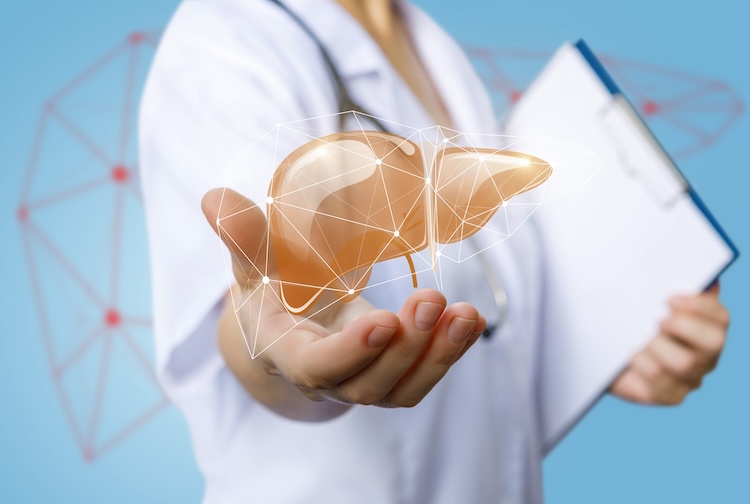
More than 85% of obese participants with fatty liver disease in a clinical trial of the experimental drug retatrutide reduced their liver fat to the point where they would no longer be classified as having fatty liver disease, according to the Virginia Commonwealth University hepatologist leading the sub-study.
Arun Sanyal, M.D., director of the VCU Stravitz-Sanyal Institute for Liver Disease and Metabolic Health, shared these findings on Nov. 13 at a meeting of the American Association for the Study of Liver Diseases in Boston. The patients were participating in a larger phase 2 clinical trial studying the treatment of obesity sponsored by pharmaceutical manufacturer Eli Lilly and Co., which was published in the New England Journal of Medicine last June. The phase 3 clinical trial began in August.
Sanyal, who has served as a consultant to Lilly, says the research findings show retatrutide could become a “bottom up” therapy for at-risk patients, preventing liver disease from progressing and possibly reversing it.
“The implications of this trial are, we could wipe out the fat very early in the course of this disease before it becomes a real threat to the liver, and, potentially, reduce the long-term cardiac, metabolic, renal, and liver-related harm from obesity. We are encouraged by these results and how they can potentially help tackle a disease that is currently without any approved therapies,” Sanyal said.
Sanyal’s research focused on the effect of two different doses of retatrutide on fatty liver disease, now called metabolic dysfunction-associated steatotic liver disease or MASLD. Patients have MASLD when fat accounts for 5% or more of their livers’ weight and at least one of five cardiometabolic risk factors, such as stroke, heart attack and diabetes.
“But significantly, by week 48, 93% of patients taking the higher dose lost enough liver fat to drop below 5%. This is quite dramatic. Because in obese populations, as much as 75% of the patients would have excess fat in the liver, but now we could have a treatment that allows you to wipe out the liver fat in patients with early-stage liver disease,” Sanyal said.
Retatrutide activates the GIP, GLP-1 and glucagon receptors that are involved with controlling hunger and satiety, allowing people to feel fuller after eating for longer. This helps to regulate blood sugar levels, leading to weight loss.
Obesity is a severe public health problem that leads to other ailments such as type 2 diabetes, liver disease, cardiovascular disease and hypertension. More than 33 million Americans have type 2 diabetes, and Sanyal says between 5% and 7% of these individuals develop clinically significant liver disease.
Research on the connection between type 2 diabetes and liver disease is relatively recent, according to the Centers for Disease Control and Prevention, but each condition increases the risk for the other. When blood sugar is too high over a long period of time, internal organs such as the liver are damaged. Similarly, high levels of fat in the liver increases the risk of developing prediabetes or type 2 diabetes. Researchers are seeing increasing numbers of people with both type 2 diabetes and liver disease. As many as up to 70% of people with type 2 diabetes also have too much fat in their liver.
Ninety-eight obese adults between 18 and 75 years old were randomly assigned a retatrutide dose. At week 48, the relative decrease in liver fat was 81.7% among those taking 8mg doses of retatrutide, and 86% for those taking 12mg. Reductions of liver fat to less than 5% occurred in 89% of the 8mg group and 93% of the 12mg group at week 48. The 48-week liver study demonstrated an average weight loss of 23.8% and 25.9% for patients taking 8mg and 12mg of retatrutide, respectively.
The U.S. Food and Drug Administration recently approved Lilly’s Zepbound for the treatment of adults with obesity. It is also sold as Mounjaro to treat adults with type 2 diabetes and research has shown it also has the ability to improve liver health by reducing liver fat.
Founded in late 2021, the VCU Stravitz-Sanyal Institute for Liver Disease and Metabolic Health is building on the successful legacy of VCU’s hepatology and liver transplant programs with the goal of becoming a global leader in liver-related research and metabolically driven disorders. It was advanced by the largest publicly shared gift for liver research in U.S. history, a $104 million gift by R. Todd Stravitz, M.D., a hepatologist in the VCU School of Medicine’s Department of Internal Medicine and former medical director of liver transplant at VCU Health.

